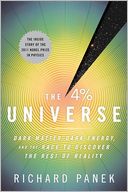Ye Olde Natural Philosophy Discussion Group
Reviews and comments on
Richard Panek:
The 4% Universe: Dark Matter, Dark Energy and
the Race to Discover the Rest of Reality [2001]

This book is about the postulated existence of “dark matter” and “dark energy” as the overwhelming majority of the matter/energy in the Universe. Our group gave this book a pretty uniform set of middle level ratings, from 4 to 6 on a scale of 0 to 10. Our group average was exactly 5.0.
Kevin had mixed feelings about the book. He liked the way it was structured and the historical development of the ideas discussed. But he didn’t feel he came away with much new knowledge. He viewed the material about Vera Rubin and the rotating universe idea as the most entertaining part of the book.
Kirby got a quick start on the book, then resumed reading it after a while and felt lost. He said it is a bit like a Russian novel—too many names! It seemed like all history and not enough actual science. But he felt the author had a good writing style. Overall he said it was disappointing but entertaining.
Scott, who is typing up these notes after a long delay, and who didn’t make any notes of what he himself thought of the book, can’t much remember what he did think of it! But he only gave it a 4, so apparently he wasn’t too impressed.
At the time of the meeting Rosie had read about 75% of
the book. She called it a pleasant, interesting read, with some funny lines. But not much
new science in it. Much of it is on the politics of doing science. She disagrees, however,
with Scott who said the book (more or less correctly) portrayed scientists as being
selfishly focused on Nobel Prizes and personal glory.
Rosie liked the discussion of the event horizon. And how the author explained how one bit of information led to the possibility of other info. She liked the phase maps and light curves material. But she felt that people without our background probably couldn’t follow the book; whereas we wanted more information on dark matter and dark energy.
Ron also felt that there was not that much new science in the book, though it is a good history of the discoveries so far. He views the book as a pretty good presentation and argument to back up the general theories of why there is dark matter and dark energy. And Ron felt that pretty much anyone interested in science could pick up the book and read it enjoyably.
Rich remarked that physics/cosmology seems to keep building on itself, and wondered just how much reality there is to all of this theory! He’d like to see a lot more evidence and proof of these theories. He also got a bit tired of all the politics and competition between the various scientific teams.
John said he both liked and hated the book—all for the same reason! He hated the academic politics. The one-upmanship and backstabbing took away from the book. John said that Panek could have told us everything known about dark matter and dark energy in a single chapter or less. He compared the book, somewhat unfavorably, to a program on the same subject on the Science Channel on TV. But John did enjoy the history part of how these conceptions of dark matter/energy came to be developed.
Barbara just read the first 40 pages of the book, and didn’t give it a rating. But she said she found the material about Vera Rubin interesting.
At the end of our discussion some of our book club members stuck their necks out and ventured the following intriguing predictions:
Rich: There is actually no such thing as “dark matter”, or at least not nearly as much of it as they now say. There is no such thing as “dark energy” either; in the end the present theory of gravitation will be modified to account for the difficulties astronomers are now having.
Rosie: I’m still quite open to the ideas of “dark matter” and “dark energy”, and also to even further-out ideas such as the “multiverse” and theories of super-symetry (“M5” stuff). [I.e., she’s more inclined to believe that current theories of dark matter/energy, etc., will hold up.]
John: “Space is not nothing anymore. The ether/vacuum
is back!”